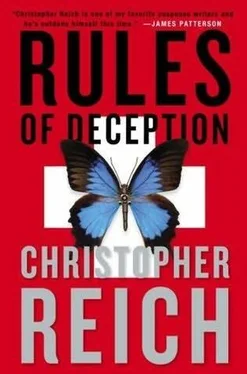“Don’t play games with me! I will not quibble over semantics.”
“God forbid we piss someone off.” Von Daniken respected the constitution as much as the next man. Never in his career had he strayed from either its letter or its intent. But a policeman’s job had changed radically in the last ten years. As a counterterrorist, he needed to stop a crime before it happened. Gone was the luxury of collecting evidence after the act and presenting it to a magistrate. Often, the only evidence was his experience and intuition.
He walked to the window and looked out over the River Aare. Dusk had turned the sky into a palette of warring grays doing battle low over the city’s rooftops. The snow, which had tapered off earlier, was falling again in earnest. A gusting wind batted the flakes into an angry maelstrom. “Don’t bother with the warrant,” he said finally.
Marti stood and rounded the desk, shaking his hand. “I’m glad to see that you’re being more reasonable.”
Von Daniken turned and headed to the door. “I have to be going.”
“Wait a minute…”
“Yes?”
“What are you going to do about the little plane? The MAV?”
Von Daniken shrugged as if the matter no longer interested him. “I’m not going to do anything,” he said.
It was a lie.
Jonathan trained his eyes on the entrance to the Landquart station, and the parking lot directly across the street from it where a late-model Mercedes sedan sat in the center of the third row, precisely where the map in Eva Kruger’s bag said it would be. His vantage point was the doorway of a shuttered restaurant fifty meters up the road. For the past ninety minutes, he’d been circling the station. Trains arrived on the half hour from Chur and Zurich. For a few minutes before and after, the sidewalk filled with commuters. Cars entered and left the parking lot. And then activity died until the next train arrived. Not once in that time had he caught sight of a policeman. Still, it was impossible to determine if someone was watching the parking lot. Whatever the case, he’d decided that Simone was right. The cops who’d wanted to steal Emma’s bags were crooked.
At five minutes to six, evening traffic was at its height. Headlights passed in a blinding parade. He stamped his boots, working to keep his circulation active. He’d left Simone at the edge of town, against her strident wishes. There was a time for teamwork and a time to go it alone. This was a solo run, no question.
Huddling inside his jacket, he kept his eyes trained on the Mercedes.
Pick up letter.
Show receipts.
Retrieve bags.
Consult map for location of parked car.
Change clothing. Slick back hair. Don’t forget wedding ring.
Change lives.
Deliver sweater with envelope containing one hundred thousand francs.
But where? When? To whom? And, most maddening of all: Why?
He ran his fingers over the car key, thinking about Emma.
Question: When is your wife, your wife?
And when she isn’t your wife, who is she?

Dr. Jonathan Ransom, graduate of the University of Colorado at Boulder, Southwestern Medical School, chief surgical resident at New York’s Memorial Sloan-Kettering Cancer Center, and Dewes fellowship recipient at Oxford Radcliffe Hospital with a specialty in reconstructive surgery, stands on the tarmac of Monrovia-Roberts Airport in Liberia, as the last of the passengers deplane and stroll past him. At eight a.m., the sun sits low in an angry, orange sky. Already, the day is hot and humid, the air rank with the scents of jet fuel and sea salt, and cut by shouts coming from the horde of black faces bunched on the far side of the stadium-high fence bordering the runway. From all too near, the rat-a-tat-tat of machine-gun fire punches the air.
Not a thing to worry about, they had promised him during his orientation. The fighting is confined to the countryside.
He walks toward the immigrations building, passing a pair of bloated corpses pushed against the fence. A mother and daughter, to judge by the way they hold each other, though it’s hard to tell because of the flies.
“You’re Ransom?”
A battered military jeep trawls alongside him. A young, suntanned woman with wild auburn hair pulled into a ponytail grasps the oversized steering wheel. “You?” she shouts to be heard over the roar of a departing transport. “You’re Dr. Ransom? Get in. I’ll rescue you from this circus.”
Jonathan throws his bag into the back of the jeep. “I thought the fighting was out in the country,” he says.
“This isn’t fighting. This is ‘dialogue.’ Haven’t you been reading the papers?” She extends a hand. “Emma Rose. Delighted.”
“Yeah,” says Jonathan. “Back at ya.”
They drive through the worst slums he has ever seen, a wall of poverty five miles long and ten stories high. The city stops abruptly. The countryside takes over, as quiet and lush as the city is noisy and barren.
“First posting, is it?” she asks. “They always send the newbies.”
“Why’s that?”
Emma doesn’t respond. A Mona Lisa smile passes for her answer.
The hospital is a converted sumphouse situated on the edge of a mangrove swamp. Dozens of women and children lie idle in the grass and the red, scalloped mud surrounding the drab building. It’s apparent that many are injured, some severely. Their silence is an affront.
“We get a group like this every few days,” says Emma, stopping the jeep around the back. “Mortar attacks. Thankfully, most of the wounds are superficial.”
Jonathan glimpses a boy with a chunk of shrapnel the size of a three iron jutting from his calf. “Superficial,” meaning he won’t bleed to death.
A short, bearded man with bloodshot eyes greets Ransom warmly. He is Dr. Delacroix from Lyon. “Good thing the plane was on time,” he says, wiping his hands on a blood-caked T-shirt. “The girl in OR two is yours. Chop-chopped her right hand.”
“Chop-chopped?”
“You know?” Delacroix makes a gesture like a guillotine falling. “Took a machete to it.”
“Where do I scrub?” asks Jonathan.
“Scrub?” Dr. Delacroix exchanges a tired look with Emma. “You can wash your hands in the lavatory. You’ll find some gloves in there, too. Save them. We try to use each pair at least three times.”
Afterward, Jonathan stands on the patch of alkali dirt outside the field hospital that serves as terrace, reception, and triage area. At midnight, the air is wet with heat, populated with the cries of howler monkeys and the punctuation of small arms fire.
“Coffee?” Emma hands him a cup. She looks different from when he saw her earlier. Thinner, smaller even, no longer so full of piss and vinegar.
“No O positive,” says Jonathan. “We lost two patients because we didn’t have enough blood.”
“You saved a few.”
“Yes, but…” He shakes his head, overwhelmed. “Is it always like this?”
“Only every other day.”
It is Jonathan’s turn not to reply.
Emma looks at him thoughtfully. “The older ones won’t come,” she says after a moment.
“Excuse me?”
“You wanted to know why they only sent the newbies. That’s the reason. It’s too hard after a while. All this gets to you. It wears you down. The older ones can’t handle it. They say you can only look at so many dead people before you start feeling dead yourself.”
Читать дальше













